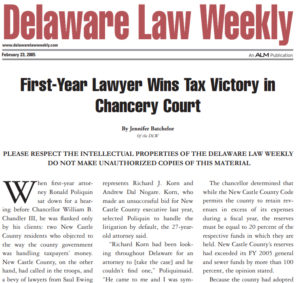Author: Jennifer Batchelor
Issue Date: 2005-02-23
Source: Delaware Law Weekly
When first-year attorney Ronald Poliquin sat down for a hearing before Chancellor William B. Chandler III, he was flanked only by his clients: two New Castle County residents who objected to the way the county government was handling taxpayers’ money. New Castle County, on the other hand, had called in the troops, and a bevy of lawyers from Saul Ewing filed into the courtroom.
The matter of the day was a preliminary hearing in Korn v. New Castle County, a case in which the Court of Chancery ultimately ruled that the county had adopted an invalid FY 2005 budget, and had exceeded its statutory authority by holding a surplus of approximately $206 million in its coffers.
A 2004 Widener University School of Law graduate, Poliquin represents Richard J. Korn and Andrew Dal Nogare. Korn, who made an unsuccessful bid for New Castle County executive last year, selected Poliquin to handle the litigation by default, the 27-year-old attorney said.
“Richard Korn had been looking throughout Delaware for an attorney to [take the case] and he couldn’t find one,” Poliquin said. “He came to me and I was sympathetic to the cause and I figured there was nothing to lose.”
According to Chandler’s Feb. 10 opinion in the matter, Korn and Dal Nogare alleged that New Castle County and various members of its government had acted illegally by accumulating unauthorized reserves within the county’s general and sewer funds.
Chandler agreed with the plaintiffs.
The chancellor determined that while the New Castle County Code permits the county to retain revenues in excess of its expenses during a fiscal year, the reserves must be equal to 20 percent of the respective funds in which they are held. New Castle County’s reserves had exceeded its FY 2005 general and sewer funds by more than 100 percent, the opinion stated.
Because the county had adopted an invalid budget and retained unauthorized reserves, Chandler declared that: 1) the New Castle County executive and council members may not make appropriations beyond a given fiscal year, unless those appropriations are encumbered; 2) the New Castle County executive cannot create off-budget reserve accounts other than those within the general and sewer funds, and 3) the county’s reserves cannot exceed 20 percent of the total estimated revenue of a given fund for a given fiscal year.
The court noted that any deviation from the 20 percent could be appropriated to the reserves either by legislative action or by altering the permitted appropriation for the fiscal year. Altering an appropriation would require a supermajority vote of the 13-member county council, the opinion said.
In addition to issuing the three declaratory judgments, the court denied the plaintiffs’ request to permanently enjoin an $80 million bond sale that county council had approved for FY 2005. The county wished to issue the bonds in order to fund certain capital projects, rather than tapping into its reserves to do so, the opinion said.
Chandler denied the injunction because the plaintiffs had failed to demonstrate that they faced irreparable harm — a showing necessary for obtaining a permanent injunction. Further, the chancellor said he doubted that the county would pursue a bond sale because he had deemed the budget on which it was based illegal.
In addition to the county itself, County Executive Christopher A. Coons, the entire county council and other officials were named as defendants in the action. Though the plaintiffs’ complaint was actually lodged against former county executive Thomas Gordon and other past officials, the recently elected Coons, and the current county government are still operating under their predecessors’ erroneous policies, the opinion said.
“It is left, therefore, to the new stewards of New Castle County to give effect to this decision and to put right the errors they have inherited,” Chandler wrote.
Poliquin said the county has proposed an ordinance that would permit the county to maintain its current reserves in off-budget accounts. Coons said only that the county is considering an ordinance that would “rectify the situation.”
When asked whether he had received assistance from more senior attorneys at his firm, Young Malmberg & Howard in Dover, Poliquin said that he had sought their counsel, but that the matter was his, and he ran with it. Thus far, handling Korn has proved a great experience, the freshly minted lawyer said.
Poliquin said the plaintiffs would like to see some of the excess funds returned to taxpayers, but that he does not believe the county plans to do so at this time. The plaintiffs are simply waiting to see what the county’s next move will be, he stated.
Should the plaintiffs disagree with the county’s plans, they will again look to the court, Poliquin said.



